Malaysians look for leadership in ‘hold-your-nose’ election
After nearly three years of shaky governments, Malaysians want politicians who can ‘do the work’.
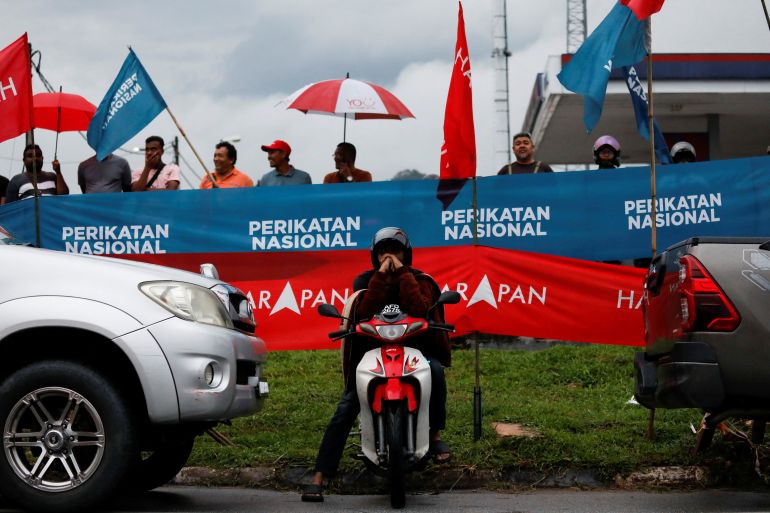
Kuala Lumpur, Malaysia – College student Jane Chen cannot wait to vote in her first Malaysian election and will be travelling two hours north to her hometown of Ipoh in northern Malaysia to cast her ballot.
“I’m looking forward to the election,” the 19 year old told Al Jazeera. “It’s the first time to vote, obviously, but it also symbolises that I’m an adult and can participate in the democratic process.”
Keep reading
list of 4 itemsAs Malaysia prepares for an election, refugees watch warily
Why Malaysia’s 2022 election is so difficult to predict
In search of stability, Malaysia to hold elections on Nov 19
Chen is one of some 1.4 million Malaysians under the age of 21 who will be able to vote in the general election for the first time – after a new law lowering the voting age to 18 was passed last year.
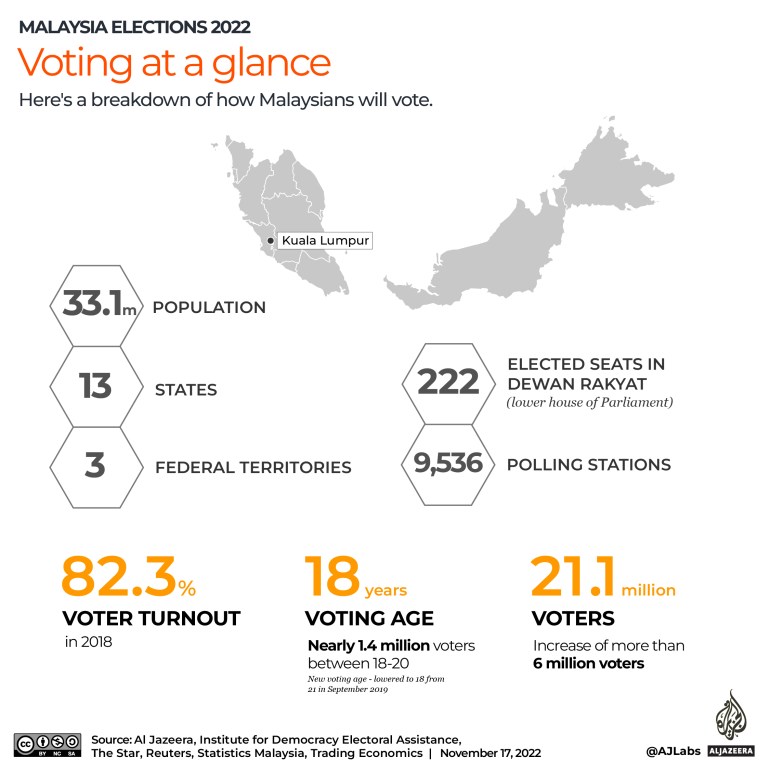
With little track record about young people’s motivations, the addition of millions of new voters thanks to automatic registration, and the emergence of new political parties and coalitions – albeit with familiar faces – the poll is one of the most closely fought, and hardest to predict, in years.
“We have three large coalitions vying for power, and each of these coalitions brings into the arena, sizable support on their own,” said Ibrahim Suffian, the co-founder and programme director of the Merdeka Center, a Malaysian survey research company. “Each of these coalitions also does not appear to have the strength to win outright. And then crowding the field are many small parties, some of them with very prominent leaders that could potentially cause upsets in certain places of the country.”
At the last election in May 2018, the choice for many voters was clear.
Malaysians were furious about the multibillion-dollar scandal at state fund 1MDB and angry at the then-government’s denial and obfuscation. The scale of the corruption, implicating then-Prime Minister Najib Razak, united the opposition behind a common cause and led to the United Malays National Organisation (UMNO) losing power in for the first time since independence.

Persistent in-fighting
Malaysians hoped the new government led by the Pakatan Harapan (PH) coalition would preside over a more inclusive Malaysia and move forward on institutional reforms.
Early signs appeared promising.
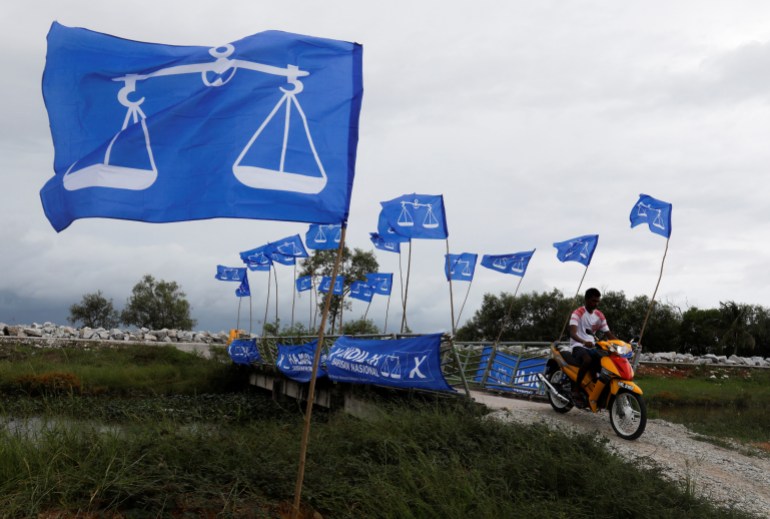
The cabinet was more reflective of a country where just over 60 percent of the population is ethnic Malay or from an Indigenous background, and where there are large communities of people of Chinese and Indian origin.
Pakatan Harapan also embarked on institutional reforms.
There was talk of abolishing the death penalty, relaxing the use of anti-democratic laws such as the colonial-era Sedition Act and signing up to key international conventions including the International Convention for the Elimination of Racial Discrimination (ICERD).
But the proposals presented an opportunity to Pakatan’s rivals who helped stoke perennial fears that affirmative-action policies in favour of the majority Malays were at risk, and Mahathir dropped plans to ratify ICERD.
In February 2020, the coalition collapsed and Mahathir resigned.
After a week of uncertainty, Muhyiddin Yassin, who had been the home minister in the Pakatan government, emerged as prime minister in a new coalition that had UMNO’s backing and left his old comrades out in the cold.
The “backdoor government” as it was derisively dubbed soon engineered elections in state assemblies previously controlled by Pakatan, even amid the COVID-19 pandemic. But after little more than a year, Muhyiddin too had fallen foul of the infighting, replaced by UMNO’s Ismail Sabri Yaakob.
Ismail Sabri has also been under pressure from his own party, in particular the senior UMNO politicians – known as the “court cluster” – who are facing corruption cases. Among them are party president Ahmad Zahid Hamidi and Najib, who is in prison after being found guilty in the first of five 1MDB-linked trials.
“The level of distrust around politicians has increased,” Bridget Welsh, an honorary research associate with Nottingham University in Malaysia and expert in the country’s politics. “Young people are looking a lot more carefully; they are looking for leadership and there’s a disconnect with these older politicians who are seen as looking to the past. This is what I call a ‘hold-your-nose’ election. People are voting for the person who is least disliked.”
Older people too are expressing increasing concern about the quality of their leaders.
Zamzaley Hussain used to work on an oil rig but now sells food from a roadside stall in a western Kuala Lumpur suburb.
“As a Muslim, I would like to vote for a party that defends my faith, champions the rights of Malays and is able to manage the economy,” he said.
“But I’d also like a candidate who can do the work, some MPs can’t work. In those circumstances, voting for the right candidate is more important than voting for the right party.”
Cost-of-living worries
A pre-election survey released at the end of last month by the Merdeka Center found the economy was voters’ top concern, along with inflation and the rising cost of living.
More than 50 percent of people also said they were dissatisfied with the current government, with the upset evident across ethnicity, age, education and income.
“At the back of their minds, the issue of governance and corruption and irregularities in terms of government affairs still lingers,” Ibrahim said. “I think many voters still realise that the change that came in 2018 – the court cases and the final jailing of former Prime Minister Najib Razak – is just the beginning of what is supposed to be an ongoing process of cleaning up government and putting things back in order. That job is unfinished.”
The Merdeka Center survey suggested that, overall, Pakatan continued to attract the most support of any coalition.
But over the course of the two-week campaign, there have been signs of nationalist pro-Malay coalition Perikatan Nasional gaining ground among Malays, with many wary that a win by the ruling coalition Barisan Nasional (BN) could open the door for UMNO’s Zahid to manoeuvre his way into the top job.
A significant proportion of voters remained undecided even in the last week of campaigning, analysts said.
“It’s all so fluid,” Meredith Weiss, a professor of political science at the University of Albany who has spent the campaign travelling around Malaysia, told Al Jazeera. “The issue is the all-powerful Malay vote, so that split could make all the difference.”
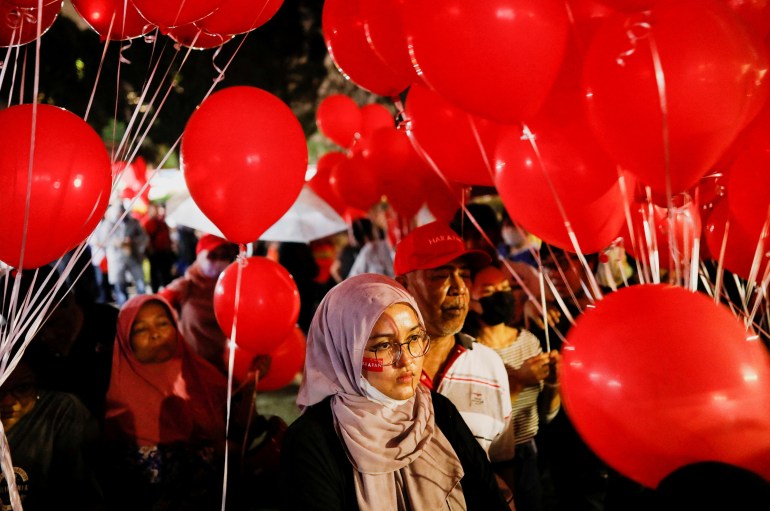
At a rally for Pakatan in a western Kuala Lumpur suburb, thousands turned out to hear the coalition’s big hitters. The mood was festive with a band pumping out local rock and throwing T-shirts to the crowd, food trucks, hundreds of red balloons and an opportunity to take a selfie with a cardboard cut-out of the local candidate.
There were even fireworks.
The crowd was a microcosm of Malaysia – a mix of ethnicities, young, old, male and female. Some parents had even brought their children.
Standing in front of a stall peddling lurid-coloured drinks was Kit Lim, a local resident who said he would be voting for Pakatan.
“It’s a little more inclusive, multiracial and perhaps a little more open to change,” the 45-year-old college lecturer told Al Jazeera. “The race and religion rhetoric is boring. I don’t think that’s the way forward.”
Standing nearby, 70-year-old Mr Chua was reluctant to divulge his full name or voting intention.
“I’m hoping for better,” he said. “Not for us, but the future generation.”
Rain began to fall. People put up their umbrellas, but few left. The crowd continued to swell.
Speaking from the stage, Fahmi Fadzil, Parti Keadilan Rakyat’s (People’s Justice Party) communications director who is defending his seat in western Kuala Lumpur, urged everyone to get out and vote. Keadilan is one of the parties in Pakatan Harapan.
“It’s your power,”, he told the crowd.
‘Votes matter’
The decision to lower the voting age led to accusations – largely from older generations – that younger Malaysians lacked the knowledge or experience to cast a vote, and had no interest in politics.
Recent months have seen a concerted effort to raise awareness about the political process and what voting is all about.
Veteran activist Fahmi Reza has been running democracy workshops at colleges and universities around the country – going online when administrators have refused to allow him on campus – and other groups have also stepped up.
At the University of Malaya, 21-year-old teaching student and activist Sharifah l’Nur Habib Idris says the apathetic are a minority, and that a “significant chunk” of the campus cohort have proved interested and eager to educate themselves about the political process and their voting rights.
“They are interested in voting because they see the effects in their everyday lives,” she said, pointing to this month’s days-long closure of the LRT rail system which meant students could not get to their classes.
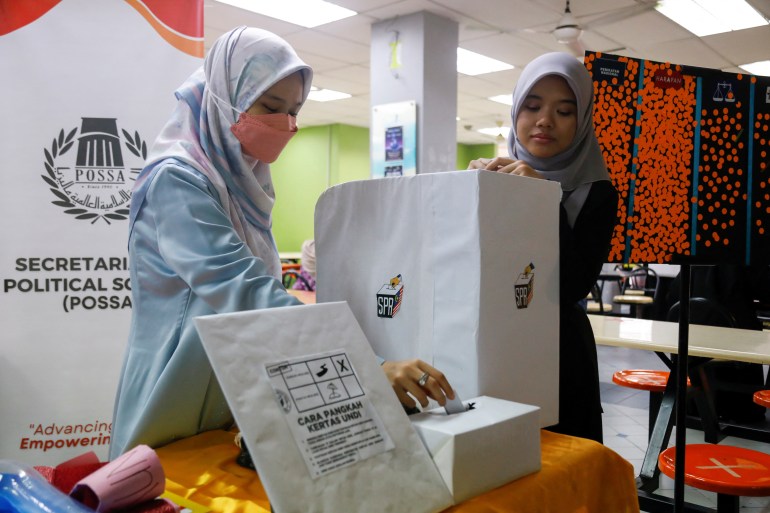
Jane Chen is also keen to get out the vote. She has taken part in Srikandi, a programme funded by the Canadian government to help educate young women about democracy, and has signed up as an election monitor for polling stations around Ipoh.
But while she is passionate about politics – and thinks it might one day be an interesting career – some of her friends are less motivated. She plans to knock on their door early on Saturday and take them to the polling station.
“Everyone’s votes matter,” she said. “It’s time for us to choose the government that we want for the future and voice out what we think matters.”